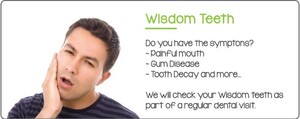-
 Find in Members
Find in Members Find in Videos
Find in Videos Find in Channels
Find in Channels
This website uses cookies to ensure you get the best experience on our website.
To learn more about our privacy policy Click herePrivacy Preference
- Tags - #wisdom teeth removal near me #wisdom teeth extraction
-
- Last updated Thu at 3:20 AM 0 comments, 1 view, 0 likes
- United States - Get Directions
More from David Raynolds
More in Politics
Related Blogs
Pain and Swelling? Understanding the Symptoms of Impacted Wisdom Teeth
Body
Wisdom teeth, also known as third molars, usually come in between the ages of 17 and 25. However, because there often isn't enough space in the jaw, these teeth can become impacted, meaning they either don't fully emerge or grow in the wrong direction. If left untreated, impacted wisdom teeth can cause pain, swelling, and other complications. Let's take a closer look at the main symptoms, the reasons behind them, and what you can do to address the issue.
Why Do Wisdom Teeth Become Impacted?
Wisdom teeth become impacted when there isn't sufficient room in the mouth for them to come in properly. They may:
✔ Grow sideways and press against adjacent teeth
✔ Remain trapped beneath the gums (fully impacted)
✔ Partially emerge, which can leave the gum susceptible to infection
Common Symptoms of Impacted Wisdom Teeth
-
Persistent Jaw and Tooth Pain
A dull, throbbing pain in the back of the mouth is often one of the first signs of an impacted wisdom tooth. As the tooth attempts to break through the gums, it exerts pressure on nearby teeth and nerves, resulting in discomfort that may intensify over time.
- Swelling and Tender Gums
Impacted wisdom teeth frequently lead to red, swollen, and tender gums in the affected area. This swelling is a reaction to the irritation and potential infection caused by the trapped tooth.
- Difficulty Opening the Mouth (Trismus)
If the wisdom tooth is impacted near the jaw joint (TMJ), it can result in jaw stiffness and make it hard to open the mouth fully. This condition, known as trismus, can make eating and speaking uncomfortable.
- Headaches and Ear Pain
Wisdom teeth are situated close to important nerves and jaw muscles, which can cause pain that spreads to the head, ears, and neck. Many people with impacted wisdom teeth often confuse their discomfort with sinus pressure or migraines.
- Bad Breath and Unpleasant Taste
When wisdom teeth partially erupt, they can trap food particles and bacteria, leading to infections and bad breath. A persistent bad taste in your mouth might indicate an infection is developing.
- Signs of Infection (Pericoronitis)
A partially impacted wisdom tooth can lead to pericoronitis, an infection of the gum tissue around the tooth. Symptoms to watch for include:
- Severe swelling
- Pus or discharge from the gums
- Fever and swollen lymph nodes
When to See a Dentist
If you have ongoing pain, swelling, or any signs of infection, it's important to see a dentist right away. A dental X-ray can help determine if your wisdom teeth need to be removed.
Conclusion
If left untreated, impacted wisdom teeth can lead to pain, swelling, and infection. If you're experiencing any symptoms, seeking early treatment can help avoid further complications and safeguard your oral health. Don’t overlook the discomfort—make an appointment with your dentist today!
Photos
Map
-
Locations on MyWorldGo
Location Information
- Location: United States - Get Directions
- Formatted Address: United States
- Country: United States









Comments